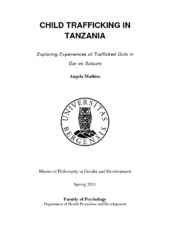| dc.description.abstract | This study focuses on the experiences of trafficked children in Tanzania. Trafficking of children deprives them of human rights and freedoms; it may also pose a public health risk. Migration of children who are fostered by extended family is a long-standing customary practice in Tanzania, but while the circumstances of fostering have changed, given increasing rural poverty and the impact of the HIV/AIDS, this has not been recognized in Tanzanian society. The government enacted the Anti-Trafficking Act 2008, and the Law of Child Act 2009, but children who migrate are increasingly being exploited and abused; this has transformed specific cases from migration into trafficking. Very little research has been conducted on the phenomenon of trafficking in East Africa and it was difficult to find any studies on child trafficking. This study explored the experiences of trafficked young girls in Dar es Salaam city. The specific objectives were: to determine the factors, motives and people involved in motivating girls to come cities; to examine the life experiences of girls from the time of trafficking to rescue; to examine coping strategies that girls use after being trafficked; and to study the processes adopted in the reintegration of rescued girls into the community and their wishes for the future. By using the empowerment theory and child protection framework, I focused on the way children were transformed from disempowerment state while trafficked, to being empowered after rescue and the start of rehabilitation. In addition, the child protection framework was used to examine the loss of child rights during the trafficking experience and how child rights can be protected. In this qualitative study, 15 girls (between 15 and 18 years) from KIWOHEDE centre narrated their life histories and five social workers from KIWOHEDE, IOM, CRS and the Tanzanian Ministry of Health and Social Welfare, were interviewed. In addition, I collected data through participant observation and document reviews. The findings show that, in spite of the laws, trafficking of children, especially in domestic labour, continues in Tanzania. Being constrained by poverty coupled with parental sickness and deaths, large families and socio-cultural factors, caregivers allow children to go to urban centres to work most of them as housegirls to their close relatives. Children themselves are attracted by the false promises of education, employment and a better life in town. The people involved were parents and close relatives; neighbours, family friends and business persons. The girls were exposed to exploitation and inhumane treatment. Some as young as 9 years old, worked for up to 20 hours a day, doing house cleaning, cooking, babysitting and petty business; they were not paid or poorly paid. They were prohibited from communication, deprived food, clothes and medical services; as well as reprimanded, beaten and sexually abused. As a result they were traumatised, wounded and some of them infected with diseases including HIV/AIDS. However, my informants after escaping from the exploitation were undergoing reintegration through education and vocational training. The experiences of the girls indicate that vulnerable girls who are assisted to migrate to Dar es Salaam may be subjected to exploitation and abuse of varying severity. I recommend child protection and respect of child rights. | en_US |
